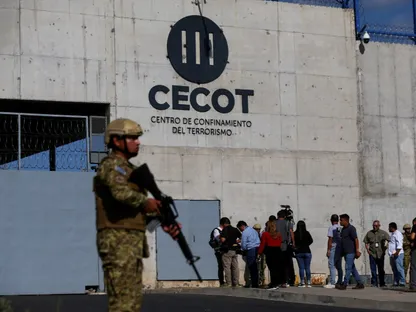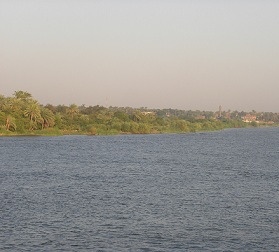The US administration says it must deport some individuals it considers “dangerous criminals” to third countries after their home nations have refused to accept them, but a review of recent cases has shown that at least five people who were threatened with this fate were returned to their countries of origin within weeks.
US President Donald Trump wants to deport millions of migrants who are in the United States illegally, and his administration is seeking to intensify third-country deportations. This includes sending convicted criminals to South Sudan and Eswatini (formerly Swaziland), two countries in sub-Saharan Africa.
Convicted migrants typically serve their sentences in the United States before being deported. This appeared to be the case for eight individuals deported to South Sudan and another five to Eswatini, although some had been released from prison years earlier.
In June, the U.S. Department of Homeland Security (DHS) said that third-country deportations allow for the removal of people “so barbaric that their home countries will not accept them”.
‘Unnecessarily cruel’ deportations
In contrast, critics have responded that it is not clear whether the United States first attempted to return the individuals to their home countries before deporting them to South Sudan and Eswatini, and that the deportations were “unnecessarily cruel”.
A Reuters review found that at least five men who were threatened with deportation to Libya in May were returned to their home countries weeks later, according to interviews with two of the men, a family member, and lawyers.
After a U.S. judge blocked the Trump administration from sending them to Libya, two men from Vietnam, two from Laos, and a fifth from Mexico were repatriated. These deportations have not been previously reported.
The DHS did not comment on the deportations. Reuters could not determine whether their home countries had initially refused to accept them, or why the United States had attempted to send them to Libya.
DHS spokeswoman Tricia Mackloflin denied that the home countries of criminals deported to third countries were willing to take them back, but she did not provide details on attempts to return the five men to their home countries before they were threatened with deportation to Libya.
“If someone comes to our country illegally and breaks our laws, they may end up in CECOT, Alligator Alcatraz, or Guantanamo Bay, or South Sudan or another third country,” Mackloflin said in a statement, referring to a maximum-security prison in El Salvador and a detention centre in the Florida Everglades.
Far from home
The DHS did not respond to a request for comment on the number of third-country deportations since Trump took office on 20 January, although thousands have been deported to Mexico and hundreds to other countries.
According to the DHS, the eight men sent to South Sudan came from Cuba, Laos, Mexico, Myanmar, South Sudan, and Vietnam. The five men sent to Eswatini were citizens of Cuba, Jamaica, Laos, Vietnam, and Yemen.
White House spokeswoman Abigail Jackson said the men deported to South Sudan and Eswatini were “the worst of the worst,” including individuals convicted in the United States of murder and child sexual assault.
“American society is safer with these illegal criminals removed,” the spokeswoman said in a statement.
The government of Laos did not respond to requests for comment regarding the men threatened with deportation to Libya and those deported to South Sudan and Eswatini. A spokesperson for the Vietnamese foreign ministry said on 17 July that the government was verifying information about the deportations to South Sudan but did not provide further comment to Reuters. The Mexican government did not comment on the matter.
On Tuesday, the government of Eswatini said it was still holding the five migrants it had received, who remain in solitary confinement under an agreement with the Trump administration.
‘A very random outcome’
In June, the Supreme Court allowed the Trump administration to deport migrants to third countries without giving them an opportunity to prove they might be harmed. However, the legality of these deportations is still being disputed in a federal lawsuit in Boston, a case that could be returned to the conservative-leaning Supreme Court.
Opponents argue that the deportations are intended to instil fear among migrants and push them to “self-deport” to their home countries rather than be sent to distant nations with which they have no connection.
“This is a message that you might face a very random outcome if you don’t choose to leave of your own volition,” said Michelle Mittelstadt, communications director at the non-partisan Migration Policy Institute.
U.S. interior immigration enforcement guidance issued in July stated that migrants could be deported to countries that had not provided diplomatic assurances of their safety within just six hours of being notified. While the administration has focused on deporting convicted criminals to African nations, it has also sent Afghans, Russians, and other asylum seekers to Panama and Costa Rica.
In March, the Trump administration deported more than 200 Venezuelans accused of gang affiliation to El Salvador, where they were held in the “CECOT” prison without access to lawyers until they were released in a prisoner exchange last month.
Mexican government data shows that more than 5,700 non-Mexican migrants have been deported to Mexico since Trump took office, a continuation of a policy that began under former President Joe Biden.
Trina Realmuto, executive director of the pro-migrant National Immigration Litigation Alliance, says the fact that a Mexican man was deported to South Sudan, and another was threatened with deportation to Libya, indicates that the Trump administration did not attempt to send them to their home countries.
‘Used as pawns’
Those who oppose high levels of immigration see third-country deportations as a way to deal with immigration law violators who are difficult to deport and may pose a threat to the American public.
“The Trump administration is prioritising the safety of American society over the comfort of these deportees,” said Jessica Vaughan, director of policy at the Center for Immigration Studies, which supports lower immigration levels.
In July, the Trump administration pressed other African nations to accept migrants, and made the same request to Palau, a Pacific island nation, among other countries. Under U.S. law, federal immigration officials can deport someone to a country other than their country of citizenship when all other efforts are “impracticable, inadvisable, or impossible.” Immigration officials must first attempt to return a migrant to their home country, and if they cannot, then to a country with which they have a connection, such as where they lived or were born.
For the man from Laos who was nearly deported to Libya in early May, hearing about the resumption of third-country deportations brought back the fear he had felt. In an interview from Laos, where he requested anonymity for his safety, he asked why the “U.S. is using us as pawns?”.
His lawyer said the man had served a prison sentence for a felony. Reuters could not determine the specific conviction.
He recalled being asked by officials to sign his deportation order to Libya, which he refused, telling them he wished to return to Laos. He said they told him he would be deported to Libya whether he signed the order or not. The DHS did not comment on the man’s account.
The man, who came to the United States in the early 1980s as a refugee when he was four years old, said he is now trying to learn the local language and adjust to his new life.

